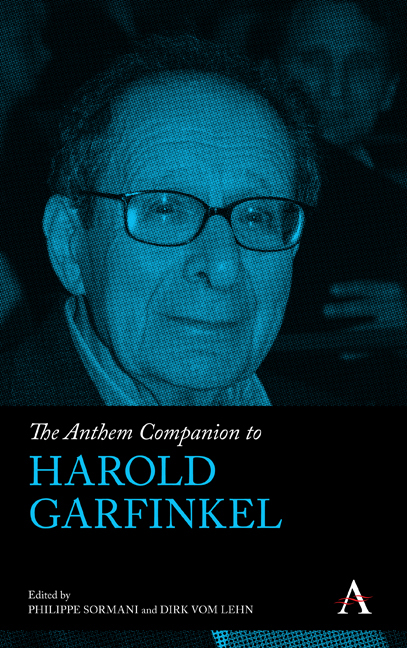Book contents
- Frontmatter
- Contents
- List of Illustrations
- Introduction: Rediscovering Garfinkel's “Experiments,” Renewing Ethnomethodological Inquiry
- Part I Exegesis
- Part II ‘Experiments’
- Part III Implications
- Postface: “Experiments”—What are we Talking About? A Plea for Conceptual Investigations
- Notes on Contributors
- Index of Names
- Index of Subjects
Chapter Seven - Gender as a Scientific Experiment: Toward a Queer Ethnomethodology
Published online by Cambridge University Press: 28 February 2024
- Frontmatter
- Contents
- List of Illustrations
- Introduction: Rediscovering Garfinkel's “Experiments,” Renewing Ethnomethodological Inquiry
- Part I Exegesis
- Part II ‘Experiments’
- Part III Implications
- Postface: “Experiments”—What are we Talking About? A Plea for Conceptual Investigations
- Notes on Contributors
- Index of Names
- Index of Subjects
Summary
Introduction
While I was conducting fieldwork on drag king workshops (DKWs)—social occasions in which female-assigned-at-birth persons transform their gender through makeup activities, verbal resources and corporeal exercises—I was intrigued by the number of reflexive activities deployed by the participants. Drag kings spent a lot of time discussing their gendered bodily transformations, theorizing on walking and its relationship to gender norms and public spaces, testing with other co-participants how gender transformation affected their spatial perceptions, and finally, over the course of their interactions, discovering the existence of a phenomenon they had been theorizing about in preceding conversations.
By “Gender as a scientific experiment,” I refer to the fact that gender can be experienced by participants as something resembling a scientific experiment—science as it is practiced within and through everyday activities. In her study on experimental demonstration and discovery as a practical accomplishment in school science labs, Sherman Heckler (2011, 13) notes that developing a disciplined perception of the world is the result of interactional work between students and teachers. In a quite similar way, interactions in DKWs lead participants to develop a fine-grained analysis and strong consciousness of gender construction processes. In DKWs, participants experiment with the transformation of their bodies, while making inquiries into the workings of (their) gender.
I will show how drag kings mobilize what Michael Lynch calls “epistopics,” epistemic topics that relate to “description, measurement, categorization, observation, reproduction” (1993, 247), while being shared by scientists within their professional activities and by lay people in the course of their ordinary practices. My focus on gender as a scientific experiment is inspired by two branches of literature. First, I draw on research from science and technology studies, ethnomethodology and linguistic anthropology, research that approaches science and daily life as practical accomplishments situated on a continuum, rather than stipulated as discrete entities. In this framework, scholars have approached science as its practical and interactional accomplishment (Latour and Woolgar 1988; Mondada 2005; Sormani 2014), a method of the “knowing-body” (Bjelić 2003, 12–13), and in its intertwining with daily life, trivial matters, poetics (Ochs et al. 1996; Latour 2007) and art (Sormani et al. 2019).
- Type
- Chapter
- Information
- The Anthem Companion to Harold Garfinkel , pp. 121 - 140Publisher: Anthem PressPrint publication year: 2023

